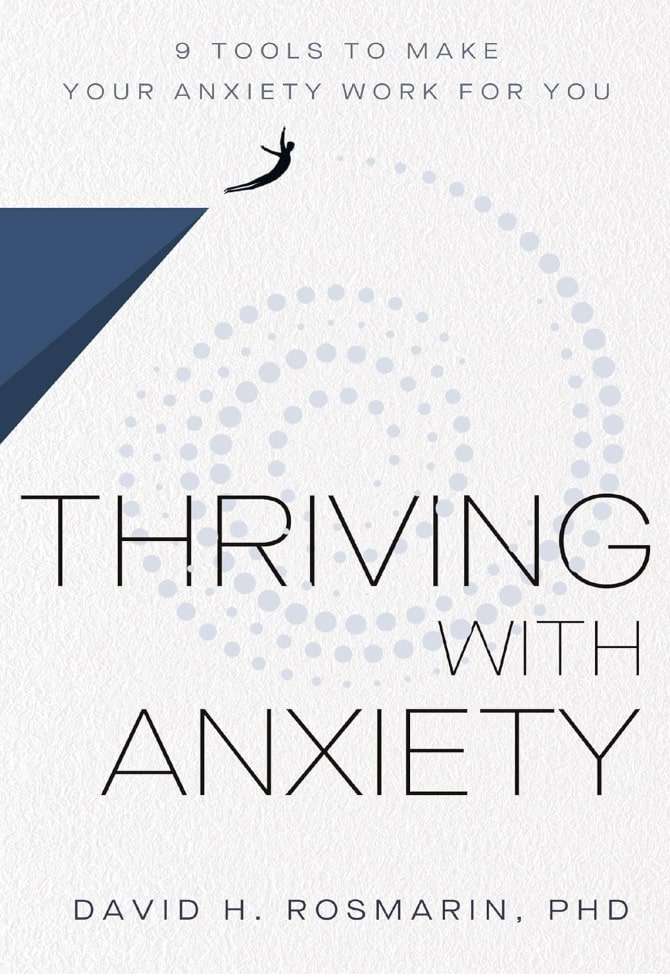What if everything you believed about anxiety — especially your child’s anxiety — was wrong?
In today’s parenting culture, we’ve been taught to fear anxiety, to fix it, to erase it at all costs. But Dr. David Rosmarin, a clinical psychologist and father of six challenges that assertion.
“We’ve created a false expectation that life should be anxiety-free,” Rosmarin told Lianne Castelino during an interview for Where Parents Talk. “Ironically, that belief is fuelling the anxiety epidemic we see in kids and teens today,” says the Associate Professor in the Department of Psychiatry at Harvard Medical School.
Rosmarin, wants parents to stop treating anxiety as a problem to be fixed — and start seeing it as an essential part of growth. “If a child doesn’t have any anxiety, something might be wrong. That startle response, the fear response — it’s part of the process of growth for humans.”
For Dr. Rosmarin anxiety, when not debilitating, is not only normal — it can be productive, even transformative.
“It’s like going to the gym”
Founder of the Center for Anxiety, Rosmarin likens it to working out. Just like physical discomfort during exercise builds muscle, he argues, emotional discomfort — including anxiety — builds psychological strength. “That pain you feel when you’re working out? That builds your muscle tone. Emotionally, we need to see anxiety the same way. It’s part of the body’s mobilization to grow to the next stage.”
Parents, he says, may misinterpret normal, healthy emotional reactions in their kids. “Often parents call me and say their two-year-old is anxious. Could it be clinical? Sure. But more often, it’s a normal stress response that will give them fortitude.”
Two types of anxiety — and one is good for you
Dr. Rosmarin, author of Thriving with Anxiety, is careful to distinguish between clinical anxiety disorders — which impair daily function and require treatment — and what he calls “normal anxiety.”
“There’s clinical anxiety, and then there’s the anxiety of life,” he says. “If it’s interfering with school, friendships, sleep — that’s clinical. But if it’s just distressing, that’s not a disorder. That’s being human.”
 In fact, he adds, completely eliminating anxiety isn’t just unrealistic — it may be harmful. “We’ve created this cultural intolerance of discomfort. And when we try to get rid of all anxiety, we’re sunk.”
In fact, he adds, completely eliminating anxiety isn’t just unrealistic — it may be harmful. “We’ve created this cultural intolerance of discomfort. And when we try to get rid of all anxiety, we’re sunk.”
“It’s okay to not be okay”
With six children ranging from toddlers to young adults, Dr. Rosmarin lives what he teaches. His home is not anxiety-free — and that’s by design. “Our kids get anxious.They have sad days. They have scraped knees and academic struggles,” he shares. “Thank God they’re not perfect, and we’re not perfect parents. We try to inculcate that it’s okay to not be okay.”
This openness, he believes, is the foundation of resilience. Parents shouldn’t aim to eliminate anxiety — they should model how to handle it. “Children mirror how we respond to our own stress,” he says.
“If they see us hiding it or panicking over it, they’ll think anxiety is dangerous. But if they see us acknowledging it, working with it, and moving forward, they’ll learn to do the same.”
Connection and spirituality: Underused tools
Among the nine tools Rosmarin outlines in his book, Thriving with Anxiety, one especially relevant to families is interpersonal vulnerability — opening up about fears and worries to a trusted partner.
“It’s raw and uncomfortable, but it creates amazing closeness,” he says. “When we open up at the right time — not in the middle of chaos — we give and receive the emotional comfort we all need.”
Rosmarin, who is director of the Spirituality and Mental Health Program at McLean Hospital, also speaks to the value of spiritual practices, especially those that emphasize acceptance and letting go. “We are limited in what we can control,” Rosmarin notes. “Whether it’s through faith or simply mindfulness, learning to surrender a little — to stop trying to control every outcome — can ease a lot of anxiety.”
 While spirituality isn’t for everyone, he encourages parents to “give themselves permission to go there” if it resonates with them.
While spirituality isn’t for everyone, he encourages parents to “give themselves permission to go there” if it resonates with them.
One simple message for parents
If he had to sum up his advice to parents in a single sentence?
“Embrace your anxiety. Embrace your children’s anxiety,” Dr. Rosmarin says. “Don’t try to shut it off. Don’t try to squelch it. Don’t try to get rid of it. Embrace that it’s part of the journey.”
For Rosmarin, anxiety doesn’t mean your child is broken. It might just mean they’re growing. “The goal isn’t to eliminate anxiety,” he says. “It’s to teach our children how to thrive with it — not in spite of it.”
Related links:
dhrosmarin.com
mcleanhospital.org
Related articles:
Understanding the Amygdala: How Training the Brain Can Help Manage Anxiety
Understanding Anxiety Styles and their Impact on Parenting


